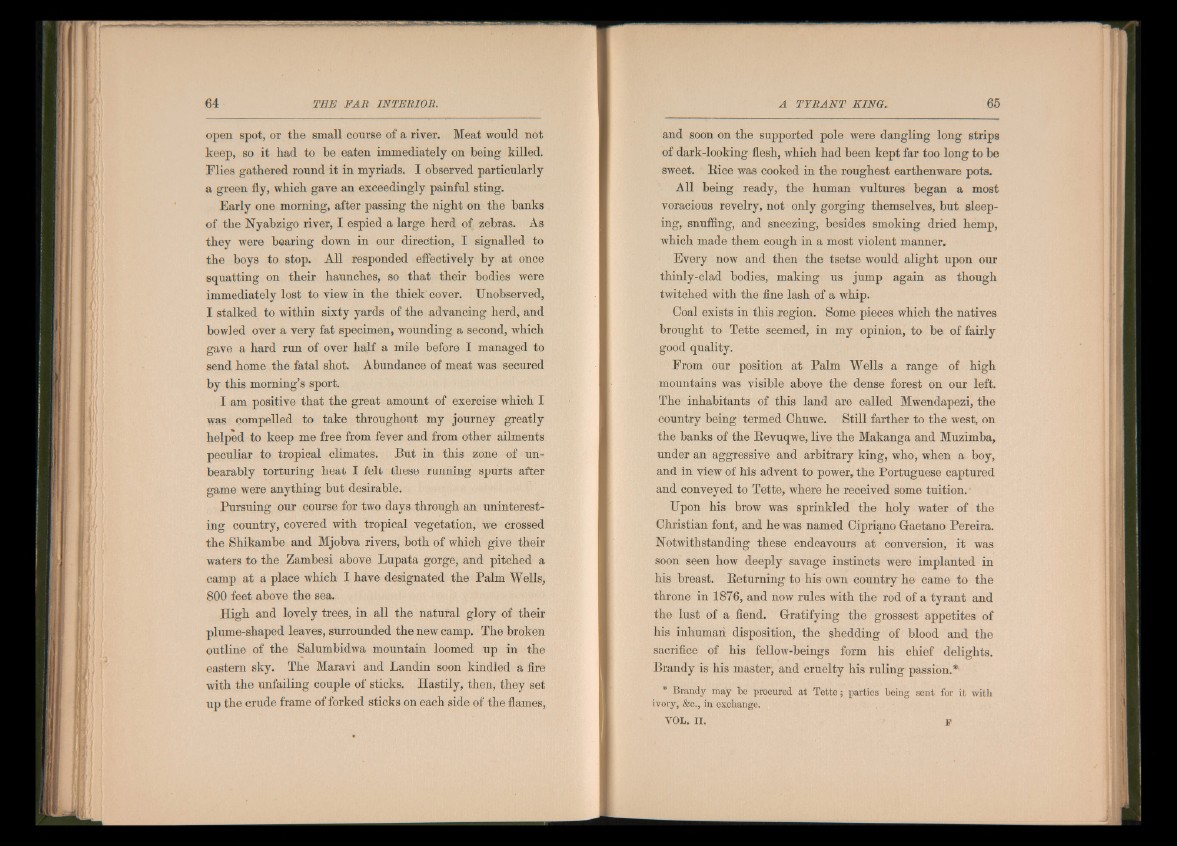
open spot, or the small course of a river. Meat would not
keep, so it had to be eaten immediately on being killed.
Flies gathered round it in myriads. I observed particularly
a green fly, which gave an exceedingly painful sting.
Early one morning, after passing the night on the banks
of the Nyabzigo river, I espied a large herd of zebras. As
they were bearing down in our direction, I signalled to
the boys to stop. All responded effectively by at once
squatting on their haunches, so that their bodies were
immediately lost to view in the thick cover. Unobserved,
I stalked to within sixty yards of the advancing herd, and
bowled over a very fat specimen, wounding a second, which
gave a hard run of over half a mile before I managed to
send home the fatal shot. Abundance of meat was secured
by this morning’s sport.
I am positive that the great amount of exercise which I
was compelled to take throughout my journey greatly
helped to keep me free from fever and from other ailments
peculiar to tropical climates. But in this zone of unbearably
torturing heat I felt these running spurts after
game were anything but desirable.
Pursuing our course for two days through an uninteresting
country, covered with tropical vegetation, we crossed
the Shikambe and Mjobva rivers, both of which give their
waters to the Zambesi above Lupata gorge, and pitched a
camp at a place which I have designated the Palm Wells,
800 feet above the sea.
High and lovely trees, in all the natural glory of their
plume-shaped leaves, surrounded the new camp. The broken
outline of the Salumbidwa mountain loomed up in the
eastern sky. The Maravi and Landin soon kindled a Are
with the unfailing couple of sticks. Hastily, then, they set
up the crude frame of forked sticks on each side of the flames,
and soon on the supported pole were dangling long strips
of dark-looking flesh, which had been kept far too long to be
sweet. Pice was cooked in the roughest earthenware pots.
All being ready, the human vultures began a most
voracious revelry, not only gorging themselves, but sleeping,
snuffing, and sneezing, besides smoking dried hemp,
which made them cough in a most violent manner.
Every now and then the tsetse would alight upon our
thinly-clad bodies, making us jump again as though
twitched with the fine lash of a whip.
Coal exists in this region. Some pieces which the natives
brought to Tette seemed, in my opinion, to be of fairly
good quality.
From our position at Palm Wells a range of high
mountains was visible above the dense forest on our left.
The inhabitants of this land are called Mwendapezi, the
country being termed Chuwe. Still farther to the west, on
the banks of the Eevuqwe, live the Makanga and Muzimba,
under an aggressive and arbitrary king, who, when a boy,
and in view of his advent to power, the Portuguese captured
and conveyed to Tette, where he received some tuition.
Upon his brow was sprinkled the holy water of the
Christian font, and he was named Cipriano Gaetano Pereira.
Notwithstanding these endeavours at conversion, it was
soon seen how deeply savage instincts were implanted in
his breast. Eeturning to his own country he came to the
throne in 1876, and now rules with the rod of a tyrant and
the lust of a fiend. Gratifying the grossest appetites of
his inhuman disposition, the shedding of blood and the
sacrifice of his fellow-beings form his chief delights.
Brandy is his master, and cruelty his ruling passion.*
* Brandy may be procured at Tette; parties being sent for it with
ivory, &c., in exchange.
VOL. II . p